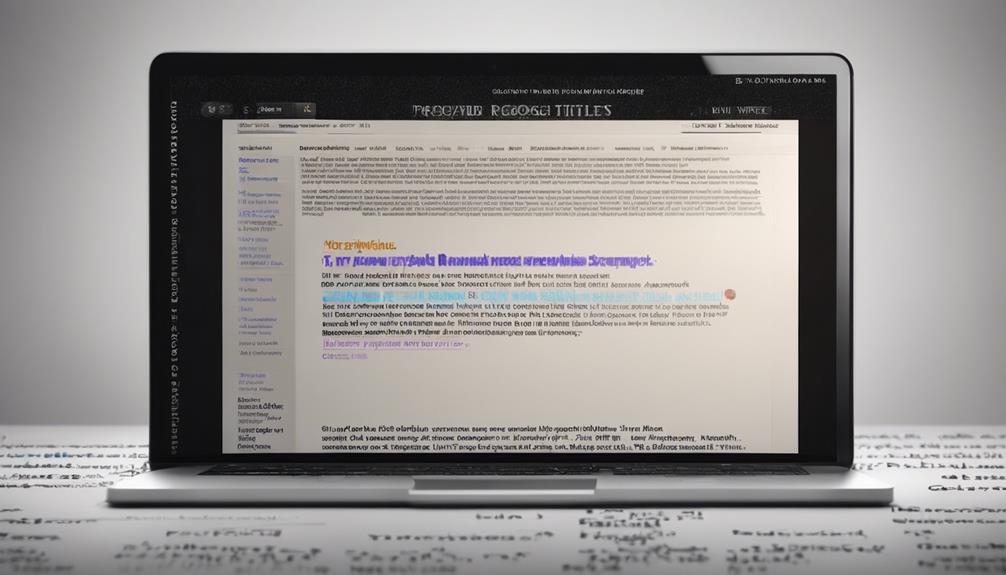Google Title Re-writes play an essential role in enhancing search visibility and ensuring a user-friendly experience in alignment with Google's dynamic algorithms. Titles are adjusted to accurately represent content and improve SEO impact. Factors such as title length, keyword integration, and chosen separators influence Google's decisions. Strategies like matching the H1 heading and avoiding keyword stuffing can minimize rewrites. Understanding these aspects is important for effective title optimization and maintaining originality in search results. For further insights into the significance of Google Title Re-writes, explore the research findings to refine your SEO practices and boost click-through rates.
Key Takeaways
- Google revises titles for user experience and search accuracy.
- Title length impacts rewrite likelihood.
- Keywords influence Google's decision to rewrite titles.
- Matching H1 headings reduces Google rewriting.
- Google prefers dashes and pipes as separators in titles.
Reasons for Google Title Rewrites

The rationale behind Google's revision of titles stems from a commitment to enhancing user experience and search accuracy. Google rewrites titles to guarantee that page title tags provide a clear and accurate representation of the content. By sidestepping issues such as excessive length, keyword stuffing, and lack of context, Google aims to present concise and informative titles that align with the content of web pages. This approach is in line with Google's algorithm updates, which prioritize user experience and search relevance.
Through SEO experiments and analyzing search results, Google has recognized the importance of presenting well-crafted titles to users. Studies, like the one conducted by Zyppy, indicate that a significant percentage of title tags undergo changes by Google, emphasizing the necessity for these revisions. The recent update in January 2021 reflects a more aggressive stance towards rewriting titles, further underlining Google's dedication to improving the overall search experience for its users. To adapt to these changes, website owners can conduct site audits using tools like Ahrefs to compare their HTML titles with the displayed SERP results.
Factors Influencing Title Rewriting
When considering the revision of titles by Google, various factors play an important role in influencing the rewriting process. Google rewrites a substantial percentage of both desktop and mobile titles, with 65% and 62% respectively as of January 2022. The majority of titles that users encounter on the Search Engine Results Page (SERP) are actually rewritten by Google itself. Surprisingly, the length of title tags has been found to have a minor impact on the likelihood of a rewrite, with longer title tags being more prone to being rephrased. Initially, Google heavily relied on the H1 heading tag for the rewriting process. Roughly 40% of the rewrites closely match about 80% of the original title tag content. These factors, along with considerations for user experience, SEO optimization, and adapting to Google's changing algorithms for mobile results, all contribute significantly to the title rewriting factors employed by Google.
Impact of Title Length on Rewrites

Considering the impact of title length on rewrites reveals significant insights into Google's preferences for search result optimization. Google tends to rewrite titles exceeding 70 characters almost 100% of the time, indicating a strong inclination towards shorter titles for improved search result display. Conversely, titles with extremely short character counts (1-5 characters) are altered in 96.6% of cases, highlighting the importance of determining the best title tag length. Titles falling within the range of 51-60 characters experience a rewrite rate of 39-42%, suggesting that this length is ideal to minimize Google's title tag rewrites. Striking a balance is essential as overly brief titles lack essential information, while lengthy titles risk truncation, negatively impacting user engagement and click-through rates. Adhering to the ideal title length of 51-60 characters can help mitigate the chances of Google rewriting the title tag, ultimately enhancing search visibility and user experience.
Role of Keywords in Title Rewrites
Keywords play an essential role in determining whether Google will rewrite title tags. When crafting page titles, incorporating top search keywords strategically can help prevent Google from altering them. This practice is important for SEO optimization, as it guarantees that the title tags maintain relevance to the content and search queries. Using keyword optimization tools can further enhance the effectiveness of titles in avoiding rewrites by aligning them closely with user intent and popular search terms. It is also advisable to include variations and synonyms of keywords to bypass Google's rewriting filters while maintaining the overall message intact.
Furthermore, avoiding excessive keyword repetition, especially with brand names, is crucial for preserving the integrity of title tags. By diversifying the range of relevant keywords within the titles, website owners can decrease the likelihood of Google rewrites. This approach not only safeguards the original intent behind the titles but also improves their visibility and ranking potential on search engine results pages.
Strategies to Prevent Title Rewrites

To mitigate the risk of Google rewriting title tags, employing strategic tactics and adhering to best practices is crucial in maintaining control over how titles appear in search results. Matching the H1 heading with the title tag can notably reduce the likelihood of Google rewriting titles by up to 20.6%. Using correct separators, such as dashes instead of pipes, in title tags can also help prevent Google from making changes. Additionally, avoiding keyword stuffing and keeping titles concise within the ideal length range of 51-60 characters can deter Google from rewriting them. It's crucial to be cautious with brand names, as Google may excessively rewrite titles containing them. Minimizing the use of brand names can prevent unnecessary alterations by Google. By implementing these SEO strategies and following guidelines for title tags, website owners can enhance the chances of maintaining their original titles in search results and minimize the impact of Google title rewrites.
Googles Preference for Separators
Google's preference for using specific separators in title tags has a significant impact on how search results display titles. When it comes to separators in titles, Google favors dashes and pipes as common choices. However, titles with pipes are more likely to be rewritten by Google compared to titles with dashes. In fact, Google tends to replace or eliminate pipes in title tags around 41% of the time. On the other hand, titles with dashes have a lower chance of being changed by Google as separators. Using the preferred separator, such as dashes, can help maintain the integrity of title tags and reduce the chances of Google rewriting them. By incorporating relevant keywords and ensuring the appropriate tag length for SEO purposes, websites can optimize their titles to align with Google's preferences and increase the likelihood of their titles remaining unchanged in search results.
Case Studies on Title Rewrite Significance

The impact of Google's preference for specific separators in title tags extends to the significance of case studies on title rewrite practices. Case studies play a vital role in understanding the intricacies of Google rewrites and how they influence SEO strategies. Through detailed analysis of various scenarios, case studies provide valuable insights into the factors that prompt Google to rewrite titles, such as title length, keyword optimization, and user search intent. By examining real-world examples and outcomes, SEO professionals can fine-tune their title optimization strategies to align with Google's preferences and enhance visibility in search results.
Moreover, case studies shed light on the results of Google experiments with title tags, offering a deeper understanding of how search engine optimization practices can be refined. Understanding the impact of title rewrite percentages based on character count and pixel limits enables website owners to craft more effective titles that are less likely to be altered by Google. By incorporating insights from case studies into their SEO approach, businesses can enhance their online presence and improve click-through rates.
Frequently Asked Questions
Does Google Rewrite Title Tags?
Google frequently rewrites title tags, especially for those with 1-5 or over 70 characters, or when boilerplate text and brand names are overly used. Aligning the title tag with the H1 tag can reduce Google's rewriting likelihood.
How Do I Change My Google Title?
To change your Google title, optimize your HTML title tag and H1 heading for relevance and conciseness. While you can't directly control Google's rewrites, adhering to SEO best practices can influence the displayed title on search engine results pages.
How Often Does Google Rewrite Meta Titles?
Google frequently rewrites meta titles, with statistics showing that as of January 2022, Google rewrites 65% of desktop titles and 62% of mobile titles. This trend has been increasing over time, with a majority of titles being altered by Google.
How Do You Write a Google Title?
Crafting a Google title involves strategically selecting 51-60 characters, aligning it with the H1 heading, and using dashes as separators. Additionally, incorporating relevant keywords and brand names can help minimize the likelihood of Google rewriting the title.
